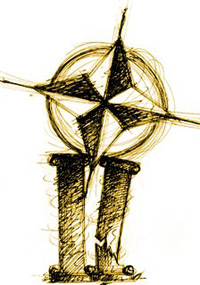
BRUSSELS
The NATO alliance seems stuck at a crossroads on Ukraine, unsure whether to move toward greater confrontation with Russia or accept the deadlocked "frozen conflict" that has emerged there.
It's a unified morass, at least, with President Obama sharing the reluctance of European leaders to escalate the crisis by providing defensive weapons to Ukraine or tightening sanctions against Russia. The United States tacitly backs the decision made by European leaders here last week to maintain the status quo — and link any easing of sanctions to implementation of the Minsk agreement that has brought a shaky truce in Ukraine.
The policy impasse was illustrated by Gen. Philip Breedlove, the NATO commander. I asked him Sunday at a conference here whether arming Kiev, which he reportedly favors, would be stabilizing or destabilizing. He indicated that he favored sending weapons, saying: "I do not think that any tool of U.S. . . . power should necessarily be off the table."
But Breedlove noted the ambiguity of the policy choice: "Could it be destabilizing? The answer is yes. Also, inaction could be destabilizing." That answer was a snapshot of the alliance's dilemma. Breedlove spoke at the Brussels Forum, organized by the German Marshall Fund of the United States, of which I'm a trustee.
The problem is that it's hard to see how current sanctions policy will lead to a true deescalation, unless Russian President Vladimir Putin has a sudden conversion. Russian analysts here say it could take years for sanctions to bite so much that they force a policy change.
Leaving aside whether a Russian economic breakdown would really be in the West's interest, sanctions may have a perverse outcome in the near term: Rather than encouraging Putin and his cronies to change course, they may instead empower the most corrupt and conservative forces in Russia.
Sanctions had just this unintended outcome in Iraq during the 1990s, when controls that were meant to punish the regime of Saddam Hussein enfeebled the mass economy but enriched elite regime cronies who could evade sanctions. Russians here warned that just such a process may be underway in Russia.
NATO has learned to live with frozen conflicts near its borders, such as between Georgia and the breakaway regions of Abkhazia and South Ossetia; and between Armenia and Azerbaijan. Diplomatic efforts to resolve these disputes have been underway for years, with little progress.
But a frozen conflict with Russia itself would be considerably more dangerous. The status quo, with Ukraine vulnerable and sanctions continuing, would mean increasing isolation and impoverishment of a Russian economy that was foundering long before Putin annexed Crimea and triggered reprisals. Russians can probably live with a declining economy — their ability to endure suffering is part of the Russian national identity — but this course seems likely to produce a Russia that's ever more lawless, unsteady and prone to violence, internally and externally.
The Brussels Forum discussions explored another dilemma for NATO: As a conventional military alliance, it is ill-prepared for the "hybrid warfare" Russia has waged in Ukraine, which has been closer to a paramilitary covert action to support proxy forces than to a traditional military attack. Breedlove acknowledged this problem and said that NATO needed to mount an "all of government" response to Moscow, including information operations and other tools that are traditionally used by intelligence agencies or foreign ministries, not military alliances.
While NATO leaders recognize they need these strategies, the debate about boosting the alliance usually centers on military hardware and whether countries are spending the promised 2 percent of GDP on defense.
The next frontier of hybrid warfare may be cyberattacks. They pose a special challenge for NATO's doctrine of collective self-defense because the attackers are hard to identify and the damage is usually limited in scope. Konstantin Kosachev, chairman of the international affairs committee of Russia's Federation Council, pointedly asked NATO Secretary General Jens Stoltenberg here Friday whether NATO would bomb a country in response to a cyberassault.
Stoltenberg gave a predictable nonresponse. "We will do what's necessary to do to protect all allies. But I'm not going to tell you exactly how I'm going to do that." His answer seemed less a calculated ambiguity than a reflection of a genuine uncertainty in NATO about just how it would find a "proportional" response in the event a member nation was attacked electronically.
Thanks to Putin, NATO now faces a clear threat to European security. But the question of how the alliance should respond is fuzzy, and it needs much more discussion. A frozen conflict can become as dangerous as a hot one.
Previously:
• 03/20/15: Obama's White House considers ending special U.S.-Israel relationship
• 03/18/15: Back to the future in Putin's Europe
• 03/11/15: Found! An outlier agency in the Washington colossus that actually deserves replicating
• 03/06/15: Targeting top terrorists just doesn't cut it
• 03/02/15: What even Netanyahu's critics must concede
• 02/27/15: America is the ally that Egypt needs
• 02/20/15: Why Netanyahu broke publicly with Obama over Iran
• 02/18/15: Jordan takes the lead
• 02/17/15: Did Netanyahu out-maneuver, take a cue from Obama and use the media to do his bidding?
• 02/16/15: In Iraq, Kirkuk remains a question mark
• 02/12/15: The Kurds need weapons, now
• 02/06/15: The United States should think -- and act -- like a superpower
• 01/30/15: A breakthrough on trade in Asia
• 01/28/15: The lesson from Yemen
• 01/26/15: Fretting over the world economy
• 01/23/15: What Saudi Arabia's coming struggle means for America
• 01/21/15: Foreign policy's post-Obama pivot
• 01/10/15: The U.S.-Iranian double game in nuclear talks
• 01/09/15: Learning from the oil market
• 12/27/14: Why is Obama refusing to support Iraqi tribes in the fight against the Islamic State?
Comment by clicking here.



 Contact The Editor
Contact The Editor
 Articles By This Author
Articles By This Author